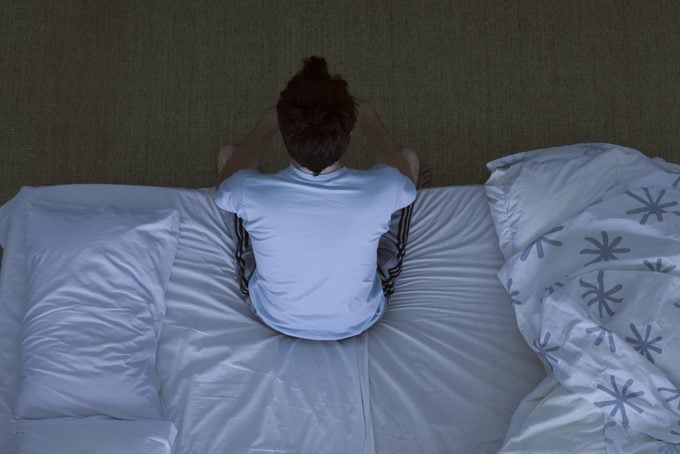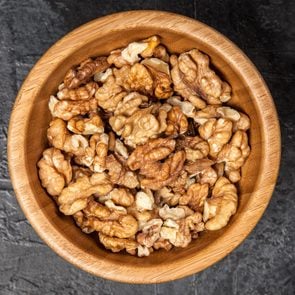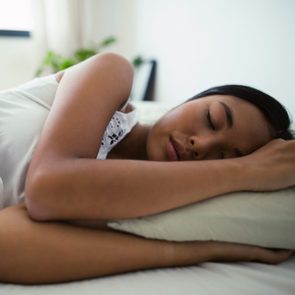If You Have Panic Attacks at Night, Here’s What to Do
Updated: May 19, 2021
They can be scary and disorienting. Here's how to cope with, manage, and even prevent panic attacks at night.
If you have ever experienced a panic attack, you’re not alone. In fact, a larger number of people experience panic attacks than you might think.
Panic attacks can occur at any time of the day. You can even be awakened out of your sleep with symptoms like an accelerated heartbeat, sweaty palms, and shortness of breath.
Panic attacks at night are not uncommon and although they can disrupt your daily life and lead to chronic sleep anxiety, there is hope. There are steps you can take before, during, and after experiencing a nocturnal panic attack that may help treat and prevent them.
What is a panic attack?
A panic attack is a sudden and intense feeling of fear or distress. These feelings typically increase before they gradually begin to fade and can happen at any time. Panic attacks are related to anxiety, says Janelle Watson, a licensed marriage and family therapist and owner of Embrace Wellness.
Anxiety affects about 40 million adults, which is around 18 percent of the population.
Although panic attacks are a symptom of anxiety, panic attacks are different from general anxiety due to the speed of onset, says Crystal Clark, MD, an associate professor in psychiatry and behavioral sciences at the Northwestern Feinberg School of Medicine.
About 3 to 5 percent of U.S. adults at some point in their life will be diagnosed with panic disorder, which is an anxiety disorder characterized by recurring attacks of sudden fear. (Although anyone can have a panic attack—they are so intense they are sometimes mistaken for heart attacks—and may never have another one.)
Panic attacks generally reach a peak of more severe or intense symptoms within 10 minutes. Unfortunately, “panic attacks don’t always wear a sign on their foreheads to announce that they might make a visit,” Dr. Clark says. “It’s very much possible for a person to experience regular panic attacks without warning.”
This is especially true for nighttime panic attacks. But if you experience frequent panic attacks, you may begin to identify specific triggers to help better prevent, manage, and cope with them—day or night.
Nocturnal panic attacks
Nighttime panic attacks occur in your sleep and can wake you up for no apparent reason. Not much research has been done to better understand nocturnal attacks and their causes.
So, when most people experience them, they become worried that their anxiety challenges are worsening or that they’re experiencing another medical issue altogether, says David Carbonell, PhD, a clinical psychologist who specializes in treating anxiety.
But research suggests that people who experience nocturnal attacks are not unicorns. Between 18 and 45 percent of people who have been diagnosed with panic disorder experience panic attacks during the day and night and most people who have nighttime panic attacks typically also have panic attacks during the day.
Because your brain doesn’t turn off while you sleep, stress and anxiety can accumulate, causing a panic attack at night, says Kevin Chapman, PhD, a psychologist who specializes in evidence-based treatment for anxiety and related disorders.
Nighttime panic attacks can be particularly frightening: You have all the same symptoms associated with a daytime attack plus you’re barely awake enough to know what’s happening.
Due to that disorientation, it may take longer for you to calm down after the attack has subsided. You might also experience fears about the attack occurring again, which can lead to increased stress and sleep loss, says Carbonell (Somniphobia is a form of extreme anxiety about sleep that can be triggered by stressful events.)

Causes
Researchers aren’t sure what causes panic attacks, but they know that some things can increase your risk. Chapman says that it’s important to understand the risk factors for general panic attacks to better address and possibly even prevent attacks at night. These are some of the possible triggers for all kinds of panic attacks:
Stress: Even if you haven’t experienced a significant life event that has caused you a large amount of stress and anxiety, you might be under the pressure of cumulative stress that builds up over time.
Genetics: If you have a family member who has a history of panic attacks or panic disorder, you may be more likely to have them too.
Underlying conditions: Conditions such as social anxiety disorder and generalized anxiety can also cause panic attacks, warns Dr. Clark.
Magnification: Magnification is when you turn an occurrence into something more serious than what it is—which can lead you to believe that a life event is “the end of the world,” or something that you “won’t survive.”
Catastrophizing: This is similar to magnification. If you catastrophize a situation you may convince yourself that a situation or event will result in a highly unlikely or the worst possible outcome.
Fear of having a panic attack: This can actually increase the likelihood of experiencing a panic attack, Carbonell says, similar to a hamster on a wheel in which the problem is also the cause.
Overanalyzing: If you are overthinking or overanalyzing a situation, it can also be problematic and trigger a panic attack. This is especially true if it leads you to predict a negative future event or to believe others see you in a negative light.
Symptoms
If you are experiencing four or more of the following symptoms—during the day or night—you might be having a panic attack:
- Feeling faint, dizzy, or lightheaded
- Sweating
- Nausea
- Chills, shaking, or trembling
- Feelings of severe fear
- Heart palpitations or an accelerated heart rate
- Shortness of breath
- Fear of losing control
- Pain, discomfort, or tightness in the chest
- Sensations of tingling or numbness
- Derealization, or feelings of unreality and detachment
You might experience fewer than four symptoms, which could mean that you experienced a limited-symptom panic attack.
What to do during a nocturnal panic attack
Even though they can be scary and disorienting, there are ways to manage nocturnal panic attacks.
“Get up, stand up, wake up,” says Carbonell. Lying in bed isn’t be the best approach when experiencing panic at night. Instead, a better approach would be to get out of bed and fully wake yourself. Drink some water, move around a bit, and splash some water on your face.
Take some slow, deep breaths and focus on your breathing. Take a slow deep breath through your nose, hold it for a few seconds, and then exhale. Pause a few seconds and then repeat. Do this a few times until you’re concentrating on your breathing instead of your panic.
The goal is to orient yourself so that you can increase feelings of control, says Angela Neal-Barnett, PhD, a professor of psychological sciences and director of the Program for Research on Anxiety Disorders among African Americans at Kent State University.
Don’t do anything that might be overly stimulating. “Stay away from you’re favorite television show during this time. Focus on engaging in activities that are calming and mild in nature,” Dr. Clark says. “Think about activities that are calming, centering, and easy.”
Carbonell suggests moving with the flow of the panic and not attempting to fight against it. “Trying too hard to distract yourself could lead to getting into a struggle with your thoughts,” he says. It’s also a great idea to focus on acceptance and observation.
Try a few mindfulness exercises, exercise and stretching techniques, or read a book. Neal-Barnett also recommends not trying to go back to sleep too soon. It’s best to wait until you’re feeling tired again.
After the attack has ended, if you’re experiencing challenges returning to sleep, completing a boring or uncomfortable chore might help you better prepare to return to bed. “Wash clothes, clean the house, or take a shower when trying to encourage sleep after an attack has subsided,” Watson suggests.
The idea is to engage in an activity that you don’t find interesting and that will not encourage you to remain awake.
Moving forward and prevention
To try to prevent panic attacks at night, start with your bedroom. Make sure to create an environment that is comforting and welcomes rest. Make sure the room is comfortable and quiet with low to no lighting.
“It might also be a great time to use an app with various calming sounds such as waves crashing, nature, or white noise,” says Watson.
Work on establishing a consistent sleep routine and giving yourself enough time to sleep so you don’t become anxious or panic over not being able to sleep at night. Typically, adults need eight or so hours of sleep each night to feel rested and refreshed.
Going to bed too late and not leaving enough time for sleep may result in constantly checking the clock and worrying that you’re not going to feel rested the next day. These negative thought processes can fuel anxiety, and potentially spiral into a panic attack.
Preparing yourself for the next day and avoiding highly stimulating activities and substances that can make you feel jittery or anxious before bed can also be helpful.
If panic attacks at night continue, you may need to check in with your doctor. In some cases, you might need medication or cognitive behavioral therapy, a type of psychotherapy that helps you come up with coping strategies.
















